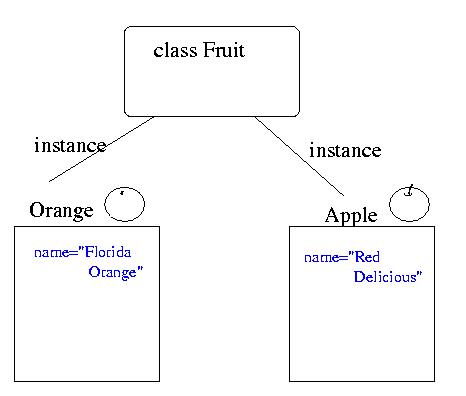- When you declare a member variable such as "name" in class Fruit:
class Fruit {
public String name;
}
you declare an instance variable.

- Fruit orange = new Fruit();
// create an object
orange.name = "Florida Orange";
// refer to orange's name
Fruit apple = new Fruit(); //
create an object
apple.name = "Red Delicous";
// refer to apple's name
- Instance variables are in contrast to class variables (which you declare using the static modifier).
- The runtime system allocates class variables once per class regardless of the number of instances created of that class.
- The system allocates memory for class variables the first time it encounters the class. All instances share the same copy of the class's class variables. You can access class variables through an instance or through the class itself.
- Why class variables?
class Fruit
{
public static int total_fruit_count = 0;
// count total number of fruit instances
public String name;
//---
constructor ----
public Fruit (String new_name)
{
name = new_name;
total_fuit_count
= total_fruit_count+1;
}
}



Here we will use an example Test_Fruit_Class program to demonstrate this:
//---------------------------------
// Test if the Fruit class
works.
//---------------------------------
class Test_Fruit_Class
{
public static void main
(String[] args)
{
System.out.println("When
Fruit class has no instance, " +
"Fruit.total_fruit_count = " + Fruit.total_fruit_count);
Fruit orange
= new Fruit("Florida Orange");
System.out.println("After
Fruit class has 1 instance (i.e., orange), "
+ "Fruit.total_fruit_count = " + Fruit.total_fruit_count);
Fruit apple
= new Fruit("Red Delicious");
System.out.println("After
Fruit class has 2 instance "
+ "(i.e., orange and apple), Fruit.total_fruit_count = "
+ Fruit.total_fruit_count);
}
}
Note here that Fruit is a class, and you can access the class variable total_fruit_count through the class itself (Fruit.total_fruit_count) or through an object (apple.total_fruit_count).
You use class variables for items that you need only one copy of and which must be accessible by all objects inheriting from the class in which the variable is declared.
- Methods are similar: Your classes can have instance
methods and class methods.
- By default, unless otherwise specified, a member declared within a class is an instance member.
- To specify that a method is a class method, use the static keyword in the method declaration.
- Instance methods
- operate on the current object's instance variables but
- also have access to the class variables.
- Instance methods are accessible only through an object.
- Class methods, on the other hand,
- cannot access the instance variables declared within the class (unless they create a new object and access them through the object).
- Class methods can only operate on class variables.
- Also, class methods can be invoked from the class itself, you don't need an instance to call a class method.
Class Method Example: main()
The main method of a program must be a class method. This method belongs to the class as a whole, not to any particular object.
- public static
void main (String[]
args)
{ //... }
- To extract an integer from a string, we use
- int i = Integer.parseInt ("5");
// this gives us i=5.
- int i = (int) Math.floor (5.2);
// this gives i=5.
Math and Integer are classes that simply group together useful methods.
The Integer.parseInt and
Math.floor methods are class methods which
we can call without creating instance objects of the class.
| Instance Methods | Class Methods | |
| can acess
instance variables |
yes | no |
| can access
class variables |
yes | yes |
| can be accessed through | only objects | objects or the class itself |